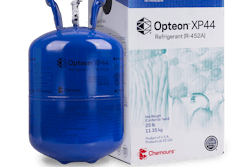
Fleets of all varieties have felt the pain at the pump throughout this year. On-highway diesel fuel prices have continued their climb throughout mid-2022, and has led fleet managers to investigate all tools at their disposal to control costs.
Operating refrigerated trailer units have even greater complexity to deal with. Managing shipping logistics while keeping refrigerated units and the trucks that haul them operating at optimal levels is no easy feat. But it’s necessary for achieving success in today’s marketplace. In 2022, one effective strategy for optimizing fleet operational costs has only been marginally explored: the deployment of low-viscosity lubricants, which can help deliver significant fuel economy benefits over a given vehicle’s lifetime.
Why have low-viscosity options gone unused? Discover how fleets can overcome hurdles, and the benefits that can be realized through the application of low-viscosity formulations.
Proof of protection
Nearly 81% of heavy-duty diesel lubricants sold in the North American market—across all fleet types—are API CK-4 15W-40. No other available grade (including 10W-30 and 5W-30) breaks the 10% threshold. Part of this may be attributable to conventional wisdom, which holds that higher-viscosity lubricants provide better protection than thinner lubricants.
This wisdom is, however, patently untrue of modern lubricant formulations. All lubricants certified by today’s API CK-4 and FA-4 performance categories must deliver the same engine protection no matter the viscosity grade. While CK-4 defines more conventional engine oil formulations that are backward compatible with older model engines, the FA-4 category was engineered to deliver enhanced fuel economy benefits in newer-model diesel engines. Per API requirements, both CK-4 and FA-4 oils deliver the same levels of high performance and engine protection.
And while some North American truck original equipment manufacturers (OEMs) do not approve the use of FA-4 formulations in their vehicles, consider that most all of them factory fill new-model engines with CK-4 10W-30 grade engine oils, indicating confidence that lower viscosities are a good choice for modern trucks. Fleets sticking with higher viscosity grades are therefore missing out on some of the benefits lower-viscosity formulations can provide.
The one-oil problem
The OEM approvals process gets trickier, however, when it comes to refrigerated unit OEMs—who were not as involved with the API’s development of CK-4 and FA-4 as heavy duty engine OEMs—they’ve been recommending the standardized use of API CK-4 15W-40 lubricants for factory fill since the category’s inception. And why not? Refrigerated units themselves do not stand to become more fuel efficient by using lower viscosities within such applications.
The use of CK-4 15W-40 lubricants do, however, tend to create an arbitrary limit on what fleets will then deploy in the trucks themselves. Most operators and service technicians want to use only one type of oil throughout these fleet—an entirely fair position. The simplicity of using one oil for both the refrigeration unit and the truck engine allows the fleet to use one fluid across the engines in their fleet. It also helps to prevent misapplication, eliminating the possibility of a service technician filling the wrong application with the wrong oil. Meanwhile, purchasing large volumes of the same formulation could potentially offer purchasing advantages.
This situation, however, prevents forward-thinking fleets from adopting lower-viscosity lubricants for use in their trucks—and therefore they may be leaving fuel efficiency benefits on the table.
Examining the benefits
According to “Trucking Efficiency Confidence Report: Low-Viscosity Engine Lubricants,” a joint report from the North American Council for Freight Efficiency and Carbon War Room, the benefits of upgrading to available low-viscosity lubricants are clear-cut.
“Class 8 over-the-road fleets can realistically expect fuel savings in the range of 0.5%–1.5% by switching from 15W-40 to 5W/10W-30 engine oil,” the report says. Going further to
FA-4 formulations where applicable can provide even greater savings, “the savings from switching to the fuel-efficient FA-4 variant … can be expected to add a further 0.4%–0.7% of increased fuel efficiency.”
While these numbers may sound small, over time, they can accumulate into significant savings, especially for larger fleets. Fleets operating a significant number of refrigerated units should weigh the potential complexity of stocking lower-viscosity lubricants for their trucks along with formulations that are explicitly approved by refrigerated unit OEMs.
It’s also worth remembering that FA-4 lubricants—although some OEMs may not have approved their use—have been proven in the field in a wide variety of applications, including usage in these refrigerated units, demonstrating the same performance characteristics and protection as their CK-4 counterparts. Running FA-4 in the refrigerated units can allow a fleet to simplify its operations, reap the fuel economy benefits via enhanced truck performance and keep both the tractor and trailer refrigerated unit engines protected.
Advocating for lower viscosities
There is growing pressure for refrigerated unit OEMs to allow the use of FA-4. Fleets want to use one engine oil for both their tractor and refrigerated unit engine applications, and low viscosities can help the fleet with efficiency value. This, in turn, can translate to bottom line benefits to their operation.
For fleets wanting to make a switch, start a conversation about lower viscosity lubricants with your oil marketer and refrigerated unit OEM supplier. They should be able to provide guidance on how to effectively leverage low-viscosity formulations to benefit the fleet. Additionally, you can reference a recently approved recommended practice from the Technology and Maintenance Council (TMC), which offers a step-by-step decision chart to see if FA-4 lubricants are right for your operation.
Today’s fleets should be deploying every tool at their disposal to combat rising fuel costs, to optimize their operations and to stay competitive. Refrigerated fleets are no different.

















